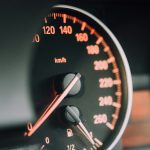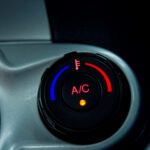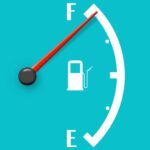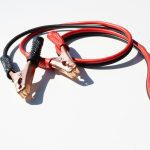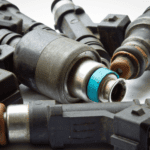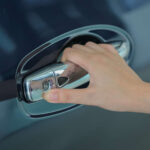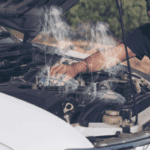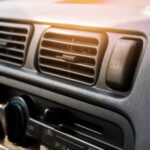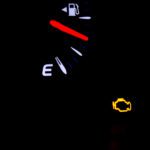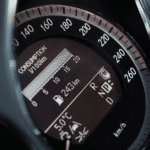Just before we get into it, the brakes seized or sticking overnight nearly always mean an issue with the rears. This is because the parking brake is usually still engaged even after you’ve released the handbrake, or at least a related component is causing them to stay locked on. It’s not always that the brakes are completely seized; sometimes, the brakes stick for a moment before releasing, allowing you to drive the car.
There are five main causes of this type of issue. Some are more common, and one of them specifically can happen, and there isn’t anything you can do to stop it. But its not really too much of a problem, more on this below.
5 Reasons Your Brakes Are Sticking After Sitting Overnight
A few different ways and things happen when your brakes seize, especially after they’ve been sitting overnight. When looking at the list below, you can ignore some of them as has unique symptoms, i.e., if you cannot drive the car because they are completely seized solid, it won’t be a surface rust issue.
Seized brake caliper
The brake caliper applies the braking force to the brake pads, forcing them to engage on the rotor and hold (parking brake) or slow the vehicle. They work the same way for the foot brake or the handbrake, but with the handbrake, a handbrake cable is used to activate the piston inside the caliper, pushing it against the pads.
What’s happening inside the caliper is there is a seal surrounding the piston that starts to turn over as you apply the handbrake or even the foot brake. When you release the brakes, the seal forces the piston to retract into the caliper, releasing any brake pressure. However, with a seized caliper, the seal may have turned over or been damaged, so the piston will no longer retract.
Depending on the severity of the seized caliper, you may be unable to drive the vehicle, as the brakes will stay permanently locked on. However, especially in this instance, with it happening overnight, the brakes may remain partially engaged, just enough for you to notice it in the morning. After driving, you may also see smoke, heat rising from the wheel, squeaking noises, and a vibrating brake pedal when braking, all from the rear wheel that has seized.
With a seized caliper, the only solution is to replace it; they do not need to be done in pairs, so if you can identify exactly which one is causing the problem replace that one only. The only downside is that seized calipers cause the brake pad surface to overheat and become brittle and scorch the brake disks, so you end up replacing them simultaneously.
Failed electronic parking motor
Electronic parking brakes are found on many new vehicles, replacing the handbrake level and cable arrangement with a button on the dashboard. They work by sending a signal to the brake caliper, which has a motor on the back, to apply and release the braking brake.
As with all motors, these can fail, and if they do while the vehicle is parked overnight, the parking brake will not release, and you will not be able to drive the car. This isn’t a particularly common problem; I have only seen it a handful of times. Unfortunately, when this type of problem occurs, it can be expensive to sort as the vehicle may need to be recovered and the caliper replaced.
There is a manual way of releasing the parking brake on the back of each motor, or you may be able to release the motor by using 12 volts to the power terminals. But the brakes caliper and motor will need recalibrating afterward, which requires a diagnostic tool. The parking will not work again until properly reset; this is effective the same as driving with a snapped parking cable.
When an electronic parking is to blame for brake seizing after sitting overnight, sometimes a simple reset with a diagnostic tool will solve the issue. However, you may need to replace the caliper, and because they have a parking brake motor on the back, they are quite costly.
Drum brake issue
Drum brakes are not commonly found on modern vehicles, but many cars still use them. They work very similarly to pads and rotor arrangement in that they have a pad, which is the brake shoe, a drum which is essentially the brake rotor, and a wheel cylinder which works like a caliper. This is all connected through a series of springs and clips.
The problem with brake shoes and why they aren’t used on modern cars is that they aren’t that reliable. If you push the brake pedal too hard several times, the wheel cylinder seal fails and leaks brake fluid, contaminating the brake shoes.
Then what happens is the bonding on the shoes comes away, and the braking surface from the shoe gets jammed when you apply the parking brake overnight. You come out to move the car in the morning, release the parking brake, the brakes are stuck on, and if you force the car into moving, the spring assembly of the brake shoes falls to bits, and you now have no rear brakes. That is about as bad as it gets, but it’s common to see with drum brakes.
It’s tricky to determine the issues without physically removing the drums and inspecting the brakes to see if a spring has got caught or broken. If you stand next to the rear wheels and have someone move the car forwards and backward, you can sometimes hear the drum shoes spring assembly rattling inside the drum and speaking noises. At the least, it gives you a good place to start your inspection.
Surface rust
Surface rust typically appears as quickly as overnight and causes the brakes to stick, usually only in damp, humid environments or after rain. You’ll know what I’m talking about if you’ve looked through the wheels at a brake rotor after it rained.
The corrosion that appears overnight fuses to pad and rotor together, you release the parking brake, and the pads briefly stick on. As you go to drive away, you will hear a clunk as the pads release from the rotor. This is not necessarily something to be concerned about, as this is common and isn’t causing any damage.
Parking brake cable problem
One commonly overlooked area with the brakes seizing after parking or even overnight is a problem with the parking brake cable. A stretched cable could cause this, the cable comes out a clip, or the parking brake cable needs an adjustment.
Either way, what is happening is that one side of the parking brake is over-adjusted, and the other side is slack. When you release the parking brake, the over-adjusted side is still causing the brakes on one side to be engaged.
Depending on the exact cause, a simple adjustment may be all that is needed; however, in some cases, you might need to replace the cable.
Is It Safe to Drive the Car?
Deciding if it is safe to drive typically means you’d need to know the cause of the problem. The thing with seized brakes that happens overnight is if it’s a surface rust or parking brake cable issue, it won’t cause you a problem when driving. So you could almost carry on forever or at least any more until the parking brake completely fails and doesn’t hold anymore or it snaps. With the corrosion issue, there isn’t a huge amount you can do to stop this, apart from ensuring the brakes are always in good working order.
However, you should avoid driving the car with another issue, for example, a seized caliper, failed electric parking brake, or a drum brake issue. You may be able to drive the car up to a few miles before facing a problem. In these instances, you should avoid driving the vehicle and have it repaired immediately; the brakes could wear out completely quickly to the point you will hear grinding noises when braking.
How Do You Stop the Brakes From Seizing After Sitting Overnight?
Stopping the brakes from seizing overnight involves ensuring the brakes are in good condition. Occasionally stripping down rear brake brakes, cleaning the pads or shoes, applying copper slip to stop edges of the pads or shoes, rewinding the calipers, carrying out a brake bleed, and adjusting the parking brake will ensure everything stays in full working order. However, unfortunately, nothing will stop random failures; you have to accept they will happen occasionally.
Final Bits
The brakes seizing overnight is a reasonably common thing to face; they might not specifically be seized to the point you can’t drive it can just be that you’ll feel the brakes grab at the rear for a second and then hear a clunk as they free themselves off, which is usually a good thing as its probably something not too challenging to repair. Hopefully, it’s just a corrosion build-up, which is normal after rain or in humid climates.
Although that can be the case, it is best not to assume and be vigilant in checking these problems; even if it’s potentially a parking brake issue, it is still the brakes.
